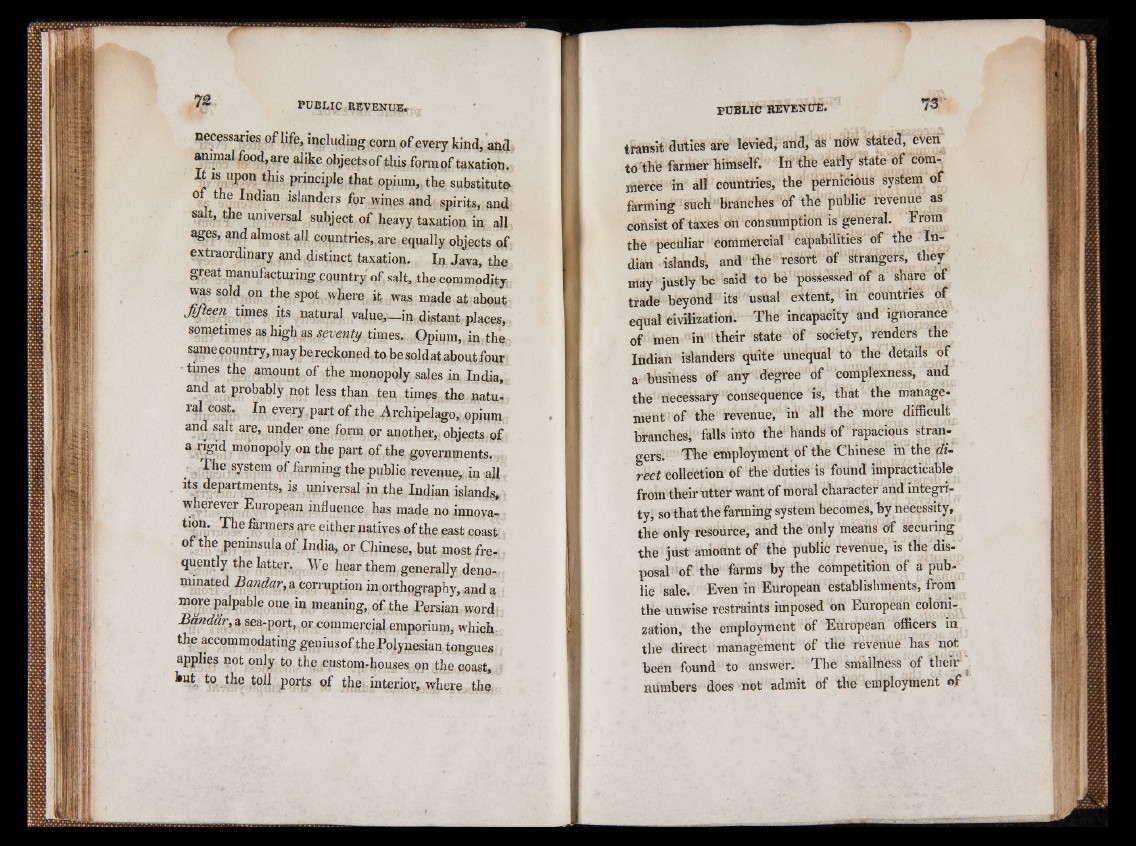
necessaries of life, including corn of every kind, and
a n i m a l food,are alike objectsof this forraof taxation.
It is upon this principle that opium, the substitut©
o ^ the Indian islanders for wines and spirits, and
salt, the universal subject of heavy taxation in all
ages, and almost all countries, are equally objects of
extraordinary and distinct taxation. In Java, the
great manufacturing country of, salt, the commodity
was sold on the spot where it was made at about
.fifteen times its natural value,-in distant places,
sometimes as high as seventy times. Opium, in the
samecountry, may bereckoned to be soldat about four
times the amount of the monopoly sales in India,
and at probably not less than ten times the natural
cost. In every part of the Archipelago, opium
and salt are, under one form or another, objects of
a rigid monopoly on the part of the governments.
/ The system of farming the public revenue, in all
its departments, is universal in the Indian islands,
wherever European influence has made no innovation.
The farmers are either natives of the east coast
of the peninsula of India, or Chinese, but most frequently
the lattçr. We hear them generally denominated
Bandar, & corruption in orthography, and a
“ ore palpable one in meaning, of the Persian word
Bandar,a sea-port, or commercial emporium, which,
the accommodating genius of thePolynesian tongues
applies not only to the custom-houses on the coast,
*° the toll ports of the interior, where the
transit duties are levied, and, as now stated, even
to the farmer himself. In the early state of commerce
in all countries, the pernicious system of
farming such branches of the public revenue as
consist of taxes on consumption is general. From
the peculiar commercial capabilities of the Indian
islands, and the resort of strangers, they
may justly be said to be possessed of a share of
trade beyond its usual extent, in countries of
equal civilization. The incapacity and ignorance
of men in their state of society, renders the
Indian islanders quite unequal to the details of
a business of any degree of complexness, and
the necessary consequence is, that the management
of the revenue, in all the more difficult
branches^ falls into the hands of rapacious strangers.
The employment of the Chinese in the direct
collection of the duties is found impracticable
from their utter want of moral character and integrity,
so that the farming system becomes, by necessity,
the only resource, and the only means of securing
the just amount of the public revenue, is the disposal
of the farms by the competition of a public
sale. Even in European establishments, from
the unwise restraints imposed on European colonization,
the employment of European officers in
the direct management of the revenue has not
been found to answer. The smallness of theii
numbers does not admit of the employment ©f